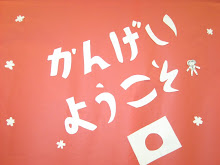Tuesday, March 9, 2010 A Block One Day
JAPANESE 3 -- First period
Song performance due today: Each student thought about a Japanese song (NOT one we have sung already) to perform (in Japanese, of course), as karaoke or a cappella, in class. (The Red and White Kohaku show might supply some appropriate songs)
D.J., Rachel G., Bundit T., Yasmin P., Melisa C., Esmeralda T., Naomi M., Susana S., Sofia F., Alisa A., Stephanie Z., Xindi S., and Zack J. performed today. Tyler L. and Jamie H. must perform on Friday.
On board:
3 Kimono 6
"stem" of the verb = what remains after you take off masu
See 言いましょう 三 And explanation on page 89 of text.
Examples:
こうこう へ うたい に 来ました。 I came to school (in order) to sing.
えいが を 身 に いきました。 I went to see a movie.
うち へ 食べ に かえりました。I went home to eat.
Form:
Destination へ Verb stem に Traveling verb.
Homework:
Write 10 sentences telling what you went to Osaka to do --
大阪 へ ___ に 行きました。
Warning: Do not use online translation sites. Use of these sites constitutes plaigiarism under Payton World Language Dept. policy.
Sally C., Tatara women’s work song from Mononoke Hime
Raymond A., Last Train Knot Lamp
Rachel G., “The girl in Byakkoya” by Hirasawa Susumu
Jacoby J., “After Dark” by Asian Kung-Fu Generation
Sofia F., “Hoshi ni negai wo” by Flumpool
Susana S., Ware wa umi no ko” (artist unknown)
Yasmin P., “Ringo no uta” by Voltaire
Xindi S., Yui – Tokyo
DJ M., Ue wo muite arukou (“the sukiyaki song) by Sakamoto Kyuu
Pranee P., “Everything” by Arashi
Melisa C., “Ryuusei namida” by Chiaki Kuriyama
Zack J., ‘I’ll Make a Man Out of You” from Mulan (Japanese version)
This song is not approved – not originally in Japanese.
Alisa A., “Life” by Yui
Tori A., “Teen Titans” by Puffy Amiyumi
Zack. J., “21 Fingers” by The Pillows
Naomi M., “Always” by Mai Kuraki
Karen Y., “Say the Word” by Namie Amuro
Bundit T., “Ride on a Shooting Star” by The Pillows
Don’t forget the literature-in-translation project. Very important point: DUE DATE IS MARCH 19th AND THERE WILL BE NO EXTENSIONS.
Get started RIGHT AWAY. So far, students have chosen (and received approval) as follows:
Bundit T., Endo Shusaku’s “The Sea and Poison”
Pranee P., Ariyoshi Sawako’s “The Twilight Years”
Esmeralda T., Dazai Osamu’s “Run, Melos! and Other Stories” (a short story collection) (approval is tentative)
Jamie H., Natsume Soseki’s “I Am a Cat” (may change)
Melisa C., Kawabata Yasunari’s “Snow Country”
Susana S., Abe Kobo’s “The Box Man”
D.J. M., Tanizaki Junichiro’s “Naomi” or ….
Sally C., Murasaki Shikibu’s “Tale of Genji” (which translation?)
Karen Y., Mishima Yukio’s “Spring Snow”
Yasmin P., Murasaki Shikibu’s “Diary of Lady Murasaki”
Sofia F., Oe Kenzaburo’s “’Teach Us to Outgrow Our Madness’ and Other Stories”
Tori A., Dazai Osamu’s “The Setting Sun”
Naomi M., Mishima Yukio’s “Confessions of a Mask”
Rachel G., Oe Kenzaburo’s “ The Silent Cry “
(Sally C. will read Murakami Haruki’s “After Dark” for extra credit)
Continuing to practice plain neg forms of verbs:
Gr. III: しない、来ない(こない)
Gr. II: 食べない、起きない(おきない)
Gr. I: 会わない(あわない)、立たない(たたない)、座らない(すわらない)、読まない(よまない)、とばない、書かない(かかない)、およがない、話さない(はなさない)
Be sure to register with Japanese site on Moodle.
JAPANESE 1 – Fifth period。
Listened to new lesson # 6 and started いいましょう 一
Collected translation/transliteration of 1Kimono: chapter 6 pages 69 to 71 in ROMAji and in えい語
Be sure to register with Japanese site on Moodle。
JAPANESE 2 Sixth Period
Reminder about fashion project: showed Nora M’s poster as an example. Project begins with finding a photo of a good-looking, well-dressed person in a fashion magazine (Ebony, Jet, etc. are of course OK) to describe. Students suggested an online site: Hot Topics. Due Friday
Discussion 日本語 で regarding months of seasons, weather, and typical activities.
Pair work on the ともだち と の かいわ for this lesson. Students in pairs must expand this with data from the reading on the season
Be sure to register with Japanese site on Moodle。
Reminder: We all must be polite in the Japanese language classroom. Not only is it important in our lives in general – it is an essential part of Japanese culture. ください、おねがい します、ありがとう、すみません Are the most important words and phrases in Japanese.
JAPANESE 4 and AP – Seventh period
This class does not meet on Block One days.
About Me

- O.Kimeru
- M.A. 1992 from U. of Chicago; Japan Foundation Fellow in 1987-88; research fellow Yokohama City University; Japanese language teacher since 1991; also taught French (member American Association of Teachers of French), English as a Second Language (to students), methodology of teaching ESL (to Japanese high school teachers), English, Japanese history/culture, drama; in 2002 and 2004, listed in Who's Who Among America's Teachers; member of Chicago Sister Cities Osaka Committee, and chair of its Education Sub-Committee; vice-president Illinois Association of Teachers of Japanese; Payton H.S. World Language Department Chair from 2003-2007, under founding principal Mrs. Gail Ward; taught Japanese and coordinated Japan Exchange at Payton from 2003 to 2010; Japanese teacher at Burr Public School beginning August, 2010
Followers
Blog Archive
-
▼
2010
(88)
-
▼
March
(16)
- March 26, 2010 A Block Two Day
- March 25, 2010 A Seminar Day
- March 24, 2010 A Block Two Day
- March 23, 2010 A Block One Day
- March 22, 2010 An Eight Period Day
- March 19, 2010 An Eight Period Day
- March 17, 2010 A Block Two Day
- March 16, 2010 A Block One Day
- March 15, 2010 An Eight Period Day
- March 12, 2010 An Eight Period Day
- March 10, 2010 A Block Two Day
- March 9, 2010 A Block one Day
- March 8, 2010 An Eight Period Day
- March 5, 2010 An Eight Period...
- March 3, 2010 A Block Two Day
- March 2, 2010 A Block One Day
-
▼
March
(16)